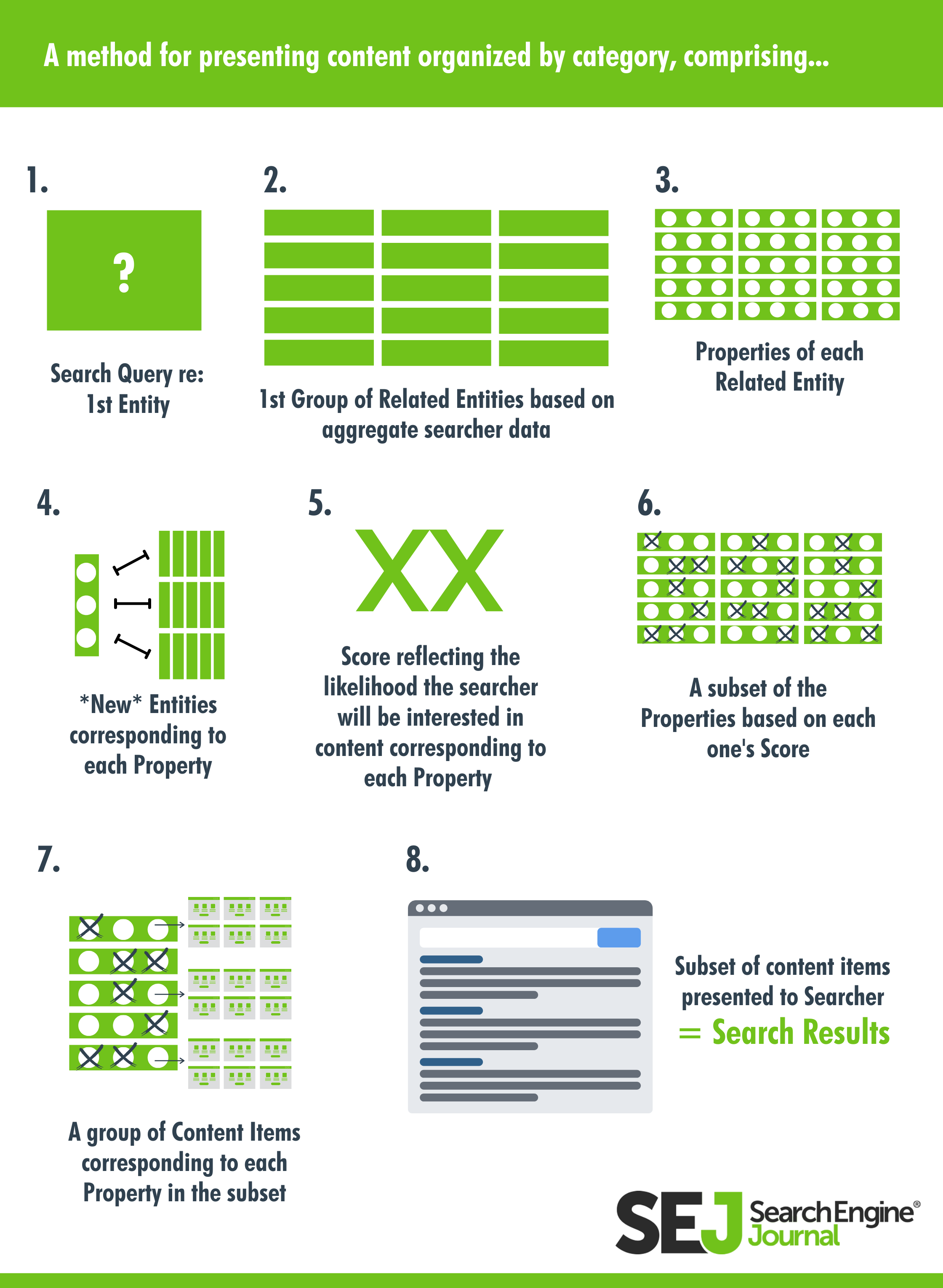There’s a newly granted Google patent out that involves methods, systems, and media for presenting content organized by category.
This patent caught my attention as it talks about related entities and describes how they fit together in the world of media.
This advances the idea of performing queryless searches, a hallmark of Google Discover, for media content such as TV shows, movies, and more.
What might this mean for searchers — and for SEO professionals? Let’s take a look.
The Challenges of Meeting Searcher Interest in Related Media
Searchers often want to find and view media content related to a particular topic.
For example, if a person is interested in a certain television show, they may be interested in:
- Viewing more or different episodes of the television show.
- Video interviews with actors from the television show.
- Episodes of other television shows that include the same actors.
- Photos of the actors, etc.
This patent tells us that it can be challenging to identify, organize, and present related content to a searcher. The difficulty might be in getting a computer to connect that information.
The patent attempts to solve this by providing new ways and media for presenting content organized by category.
“Methods, systems, and media for presenting content organized by category” begins by showing an informational need that many people have, then describes a solution to that problem in a patent granted on June 15, 2021.
Presenting Content for Related Entities Organized by Categories
The patent shows ways of presenting content organized by category.
Here’s how it works:
- A search engine receives a request for a page with content about a first entity.
- A first group of related entities is identified based on searcher interaction information.
- A number of properties regarding the first entity are identified.
- A second group of entities is identified for each of those properties.
- Each of those properties receives a score based in part on the first group of entities (identified based on the searcher interaction information) and the second group of related entities for the property.
- The score indicates a likelihood that a searcher of the searching device will be interested in content about the property.
- The search engine determines a subset of the properties in the group of properties based on the score of each one.
- It identifies a group of content items for each of the properties.
- A subset of content items from the group of content items is determined.
- The content items are shown on the computing device.
Here’s what that could look like in practice, based on the above:

This Google Patent Suggests a Media Knowledge Graph
To a degree, this patent is describing a knowledge graph of related entities and attributes without saying the phrase “knowledge graph.”
But that is what interested me in it — seeing how it looks for related entities, properties and attributes, content items, and how everything might be connected is at the heart of this approach.
A few technical observations of note:
- Calculating the score for properties may mean calculating a proportion of entities included in the second group of entities included in the first group of entities.
- The subset of content items can be determined based on the popularity of each content item in the group of content items.
- The system may also mean selecting, for each property in the subset of properties, a content type based on the popularity of content items associated with the property and the content type, where indications of the subset of content items are presented according to the content type and the property corresponding to each content item.
- At least one content item included in the subset of content items can include the aggregation of multiple videos.
- The first entity can be the name of a character in a media content item.
- The group of properties can include a property corresponding to other media content the character has appeared in.
For each property in the group of properties, identifying the second group of entities corresponding to the property comprises means for accessing a database that indicates an interconnection of each entity in the second group of entities to the first entity via the property.
This is a means of categorizing media content around related entities.
This patent can be found at:
Methods, systems, and media for presenting content organized by category
Inventors: Alexander Pak, Felix Raimundo, Sertan Girgin, Raphael Marinier, and Vincent Simonet
US Patent: 11,036,743
Assignee: Google LLC
Granted: June 15, 2021
Filed: May 23, 2016
Abstract:
Methods, systems, and media for presenting content organized by category are provided. In some embodiments, the method comprises: receiving a request to present a page indicating content related to a first entity; identifying a first group of entities related to the first entity based at least in part on searcher interaction information; identifying a group of properties corresponding to the first entity; identifying, for each property, a second group of entities corresponding to the property; calculating, for each property, a score for the property; determining a subset of the properties in the group of properties based on the score of each property; identifying, for each property in the subset of properties, a group of content items corresponding to the property; determining a subset of content items from the group of content items; and causing a searcher interface indicating the subset of content items to be presented.
Mechanisms for Presenting Media Content Organized by Category Are Provided
The objects described in the patent can identify content related to a particular topic and determine whether the identified content is likely to be interesting to a searcher using a combination of multiple sources of information.
For example, the sources of information can indicate topics related to a first topic, where the relatedness of two topics is inferred based on searcher behavior:
- Search queries of a searcher.
- Content that searchers typically view in the same viewing session.
- Any other suitable type of searcher behavior.
The sources of information may include structured information that indicates properties that relate to topics.
In this example, the structured information may indicate that two movies are related to each other because they feature a particular actor (whom Google recognizes as an entity in both).
We may then see information indicating that two content items are related, inferred based on searcher actions, with structured information indicating a manner in which two content items are related.
The mechanisms can then cause content identified to be relevant to a particular topic to be presented in a searcher interface that may group the identified content based on a property that relates the identified content to a particular topic.
A group of properties may be associated with a first topic or entity and a group of topics or entities associated with each property.
A property may indicate any suitable field or category associated with a particular topic or entity through which that particular topic or entity is related to other topics, entities, or other information.
More Media Examples
For example, where the first entity is a fictional character, the group of properties may include:
- Movies in which the fictional character has been portrayed.
- Actors who have portrayed the fictional character.
- Other suitable properties.
Continuing with this example, a group of related entities corresponding to the property of movies in which the fictional character has been portrayed can include each movie’s names.
The mechanisms can then identify content items related to the entities in the group of related entities. It can also cause indications of these content items to be presented in a searcher interface organized by property.
For example, in instances where the entities in the group well-known entities include names of movies in which the fictional character was portrayed, the content items can include:
- Clips from the movies.
- Soundtracks from the movies.
- Other suitable content items.
A search system may identify properties associated with the first entity using any suitable technique or combination of techniques.
A candidate group of properties can be identified, for example. A subset of the candidate group of properties can be identified based on how relevant each property is to the first entity, which is based on how interesting each property is likely to be to a searcher.
In another example, where the first entity is a fictional character, the candidate group of properties may include:
- Movies in which the character was portrayed.
- Actors who have portrayed the character.
- A fictional birthday of the character. Continuing with this example, in some embodiments, the mechanisms described herein can determine that the properties of movies in which the character was portrayed and actors who have portrayed the character are likely to be the most interesting to a searcher
Following the same example, the content corresponding to each property may be identified using any suitable information and techniques.
The mechanisms may identify the content items based on the popularity of multiple content items relevant to each selected property.
This Patent Points out a Wide Range of Types of Content
Content items may be any suitable types of content, including:
- Video content.
- Audio content.
- Television programs.
- Movies.
- Live-streaming content.
- Audiobooks.
- Documents.
- Webpages.
- Other suitable types of content.
The content items may also include compilations and/or aggregations of multiple content items.
The content item may be a playlist of content items that are presented in a particular order. They could also be a channel of content associated with a particular topic and/or content creator.
The Search Interface for Presenting Content Organized by Category
This is what makes this media-based knowledge graph browseable to explore relationships and connections between characters and stories.
The searcher interface can include:
- Title.
- Categories.
- Content recommendations within the category.
The Title can be any suitable title and can indicate:
- An entity or a topic, such as a character (fictional or non-fictional).
- An event.
- A television program.
- A book.
- An interest or hobby.
- Any other suitable topic.
The title can include any suitable text, images, graphics, animations, hyperlinks, or other suitable content.
The patent tells us to note that the location of the title within the searcher interface will be shown as an example and that the title can be presented at any suitable location. The title can even be omitted.
The searcher interface may include suitable categories related to an entity or topic corresponding to the searcher interface.
They provide an example: If the searcher interface is related to a particular fictional character (e.g., “Superhero X”). The categories may include movies in which the fictional character was portrayed (e.g., “Movie 1”), an actor who has portrayed the fictional character (e.g., “Actor 1”), or any other suitable categories.
Note that the patent tells us that any suitable number of categories can be included.
Each category presented in the searcher interface may include indications of media content items corresponding to that category.
For example, if the category is from a particular movie, then the content recommendation may be a playlist of songs and/or music videos included in a soundtrack of the movie.
The content items could be:
- Videos (e.g., scenes from a movie, interviews with actors from a movie, a trailer, and/or any other suitable videos).
- A collection of media content related to the category (e.g., a playlist of songs, a playlist of videos related to the category, a channel associated with the category, or any other suitable media content).
- Links to websites associated with the category.
- Images.
- Or any other suitable types of content.
The patent also asks us to note that each category may include any suitable number of content items.
Categories in the searcher interface and content items in each category can be identified using any suitable technique or combination of techniques. Those categories may be based on topics or entities relevant to a topic.
Or, the content items presented in each category may be based on the popularity of the content items.
Presenting Content Organized by Categories Overview
I thought this was interesting because it draws together related entities and topics to allow searchers to explore those relationships and connections.
Before Google introduced the knowledge graph, they were working on a Browseable Fact Repository. We are returning to the point where they want to show us the connections in a field like media (which could attract a lot of attention).
It covers a wide range of media and entertainment, which a series of Google patents have covered in the past. However, they do have a handful of media consumption histories, where they collect information about the media that individuals consume as part of our daily lives.
Google has been putting a lot of effort into fleshing out a media knowledge graph and content items for different related entities to find new episodes, characters who act together, series of shows, awards, prizes, producers, directories, and others who work on media.
The possible categories that this patent can cover can encompass an extensive range. In addition, the media examples it provides can show how it could connect a lot of related entities.
More Resources:


